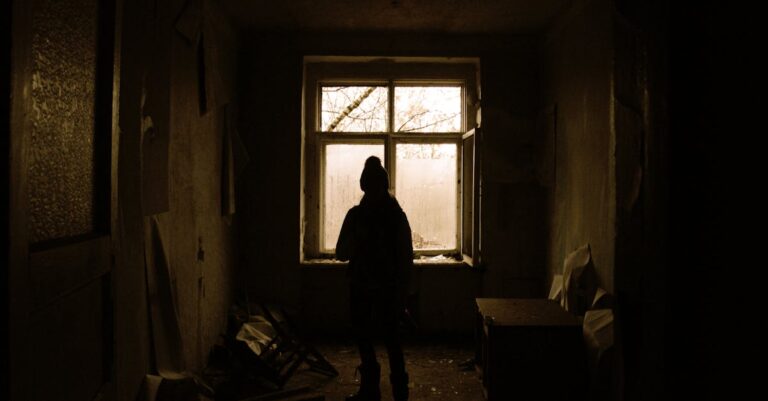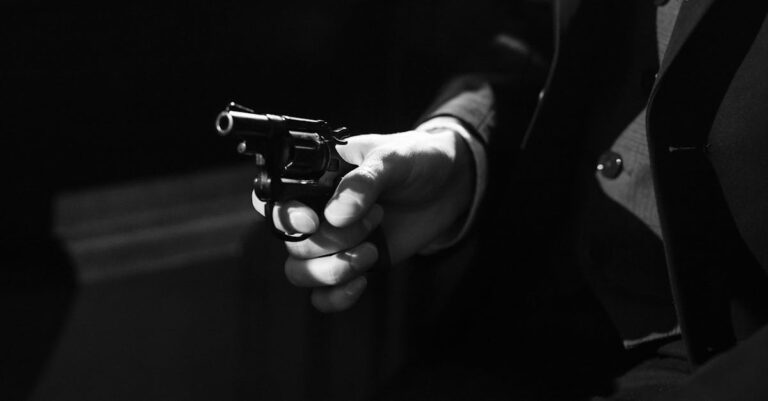
The air tasted like iron as Mara stepped off the bus, her boots crunching gravel underfoot. The town of Blackmoor clung to the hillside like a wound, its crooked buildings leaning toward each other as if sharing secrets. She hadn’t been back since the summer she turned sixteen, when the creek behind her father’s house had run red for three days. Now the road was gone, replaced by a rusted gate marked with symbols she didn’t recognize. A crow cawed overhead, its call sharp enough to cut through the fog that rolled in from the river.
“You shouldn’t be here,” said a voice behind her. Mara spun, her hand flying to the knife on her belt. The man was tall, his face hidden beneath a wide-brimmed hat. His coat hung open, revealing a silver chain that caught the weak sunlight. “This place is dead,” he added, his voice low, like gravel underfoot. “You’ll only find what you’ve lost.”
She didn’t answer. The creek’s memory pulsed in her skull—her father’s scream, the way the water had bubbled like a cauldron. She’d buried the memory deep, but something about this town had a way of unearthing things. The man tilted his head, studying her, then turned and disappeared into the mist.
The boardinghouse stood at the edge of town, its windows boarded up like closed eyes. Mara pushed open the creaking door, the smell of mildew and old wood filling her nostrils. A single bulb flickered above the staircase, casting jagged shadows on the walls. She climbed to the second floor, her fingers brushing the peeling wallpaper. The room at the end was exactly as she remembered—faded blue curtains, a cracked mirror, a desk covered in dust. But the drawer beneath it was open, its contents scattered: a journal, a key, and a photograph of her mother, her face half-obscured by a smudge of something dark.
The journal’s pages were filled with frantic scrawl. “They’re watching,” one entry read. “The veil is thin here. I can hear them in the walls.” Mara’s breath quickened. She turned another page, her pulse hammering as she read about rituals, about a circle of men who’d come to Blackmoor seeking something they couldn’t name. The last entry was incomplete, the ink smudged as if the writer had been interrupted.
A knock at the door made her jump. She grabbed the knife, her hand steady. “Who’s there?”
“Just checking on you,” said a woman’s voice. Mara hesitated, then unlocked the door. The woman stood in the hallway, her hair streaked with gray, her eyes dark and unblinking. “You’re Marianne Voss,” she said. “Your father’s daughter. I knew him. Knew what he tried to do here.”
Mara’s throat tightened. “What did he do?”
The woman stepped closer, her voice dropping to a whisper. “He tried to close the door. But some things don’t stay shut.” She turned and walked away, her footsteps echoing down the corridor.
That night, Mara couldn’t sleep. The house creaked and groaned, as if it were alive. She sat by the window, staring at the dark woods beyond the town. A sound drew her attention—a low hum, like a distant engine. She grabbed her flashlight and stepped outside, the cool air biting her skin. The woods were silent, but the hum grew louder, vibrating in her bones.
Then she saw it: a flicker of light through the trees, too steady to be fireflies. She moved toward it, her boots sinking into the damp earth. The light grew brighter, revealing a clearing where a circle of men stood around a pile of stones. They wore black robes, their faces hidden beneath hoods. At the center was a figure, bound and trembling. Mara’s breath caught—she recognized the face. It was the man from the gate, the one who’d warned her.
“You shouldn’t have come,” he said, his voice hoarse. “This place feeds on the lost.”
Mara stepped forward, her knife raised. “Who are you? What is this?”
The leader of the group turned, revealing a face etched with scars. “We are the keepers,” he said. “The ones who remember what others have forgotten. Your father tried to break the cycle, but he failed.”
“What cycle?”
“The one that binds this town to the other side. Every generation, a Voss is born to stand guard. But you’ve come too late.” He gestured to the stones, which pulsed with a sickly blue light. “The veil is thin. And it’s hungry.”
Mara’s mind reeled. The journal, the symbols, the man’s warning—it all connected. She thought of her father’s scream, the red creek, the way the town seemed to breathe around her. “I’m not afraid of you,” she said, her voice steady.
The leader smiled. “Good. Because you’ll need courage for what comes next.”
The ground trembled. The stones flared brighter, and the air thickened with a low, guttural sound. Mara tightened her grip on the knife, her heart pounding. She didn’t know what awaited her in the darkness, but she knew one thing: she couldn’t turn back.


